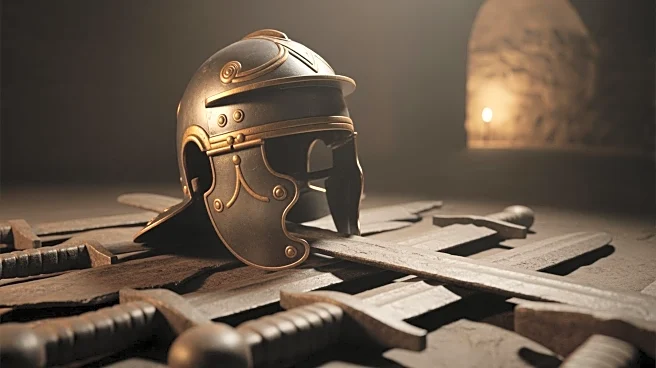What's Happening?
Archaeologists have identified seven fully preserved skeletons found in a well in the ancient Roman city of Mursa, located in modern-day Croatia, as Roman soldiers who lived approximately 1,700 years ago.
The discovery was made during a 2011 excavation, where the well had been repurposed as a mass grave. The city of Mursa, conquered by the Romans in the first century B.C., was a significant trade and craft center near a military zone. The skeletons, belonging to taller-than-average adult men, were found in various positions and depths, suggesting they were buried simultaneously. The remains showed signs of early-life stress and injuries consistent with battle wounds, such as blunt-force trauma and puncture wounds likely caused by weapons. Carbon and nitrogen isotope analyses revealed a diet rich in grains and vegetables, with little meat, and DNA analysis indicated that the soldiers were not local to the area.
Why It's Important?
This discovery provides valuable insights into the historical conflicts that shaped the Roman Empire's expansion and its eventual decline. The identification of these soldiers highlights the turbulent period known as the Crisis of the Third Century, marked by civil wars, foreign invasions, and economic instability. Understanding the soldiers' origins and lifestyles offers a glimpse into the diverse composition of Roman military forces and their role in defending and expanding the empire's frontiers. The findings also contribute to the broader understanding of Roman military strategies and the socio-economic conditions of the time, which have implications for historians studying the empire's rise and fall.
What's Next?
Further analysis of the site and the remains could provide additional information about the soldiers' identities and the specific battles they were involved in. Continued archaeological exploration in the area may uncover more artifacts and structures that can offer deeper insights into the daily lives and military operations of Roman soldiers. Researchers may also focus on comparing these findings with other Roman sites to build a more comprehensive picture of the empire's military history and its impact on the regions it controlled.
Beyond the Headlines
The discovery raises questions about the ethical considerations of excavating and studying human remains, particularly those of soldiers who died in battle. It also highlights the importance of preserving archaeological sites and the potential for new technologies to enhance our understanding of ancient civilizations. The findings may influence cultural heritage policies and the way historical narratives are constructed, emphasizing the need for a balanced approach that respects both scientific inquiry and cultural sensitivity.











